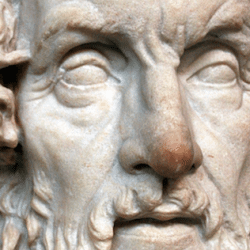There is further evidence concerning the meaning of nomos in Greek culture, coming from Martha Nussbaum’s Fragility of Goodness . In a discussion of Euripides’s Hecuba , Nussbaum points out that Polyxena, Hecuba’s daughter who is offered as a human sacrifice by the Greeks to appease the shade of Achilles, goes to her death with great dignity and great confidence in the conventions of society, the NOMOS whose distinctions structured life, whose guidance pointed to the society’s chief values, and whose government of human responses of praise and blame shaped expectations. Nussbaum points to a particular scene to make the point: “As she fell in death, reports the incredulous herald, even at that ultimate moment she took thought to arrange her skirts so that her body would not be revealed in an immodest way. This displays, of course, astonishing presence of mind. But it is even more astonishing for its display of trust. Dying, she does not think to doubt that a group of Greek soldiers will respect, after her death, the chastity of her skirt. If she acts well, she will stand, and be received.” Further, she shows confidence in nomos , and “what she trusts, in the world of nomos , is the express, through the eyes of others, of friendship, honest, compassion. By contact of eyes, these characters join each other in, and acknowledge, a shared moral universe.”
The play makes it clear, however, that this trust in nomos is misplaced. Not only is Polyxena sacrificed, but Polymestor, a guest-friend of Hecuba and her husband Priam, kills Hecuba’s son Polydorus, who is in his care. Hecuba loses confidence in the nomos that governs relationships like guest-friendship, and substitutes instead a nomos of “of solitary, power-seeking vengefulness,” wreaking a horrible vengeance on Polymestor.
Nussbaum’s claim that Polyxena places “trust” in nomos offers a striking parallel with Paul. If we imagine Paul addressing this problematic, rather than the problem of works-righteousness, Paul takes on a different coloration. In this context, as in the context of individual moral achievement, Paul denies that anyone can trust in nomos for health and salvation. But in this context, this denial means that no one can trust in nomos to achieve social order, or to achieve the promise to Abraham of a unified international family of nations (Rom 4). Perhaps we can even imagine Paul working wgainst the background of sophist deconstruction of nomos as “mere convention”; in that context, the problem of nomos is not that people ignore and violate it and thereby make it ineffective, but that humans, since they have made the laws, can change them at will. How can nomos order life when nomos itself is flexible and variable?
Much more to consider here, but the general point seems worth pursuing: Namely, that Paul is not only addressing the problematics of Jewish Torah, but also addressing the issues surrounding the failure of nomos in the Greco-Roman world. Those issues are probably more closely parallel than we tend to think, but the concentration on individual soteriological concerns has made it look like the problems surrounding Torah are different from issues of nomos .















